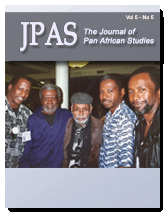ARCHIVE ISSUE
 Volume 5 • Number 5 • 2012
Volume 5 • Number 5 • 2012
On the Cover: Authors (L-R) Larry Ukali Johnson-Redd, Dr. Arthur Joseph Graham, Amiri Baraka, Itibari M. Zulu, and Mark K. Charlton-Davis at the San Francisco Tenderloin Book Fair & University of Poetry, January 31, 2004 in San Francisco, California presented by Recovery Theatre, Inc. in celebration of the Black Arts Movement (Marvin X, Book Fair producer and director of the Recovery Theatre).
● Museum, Memory and Discursivity: The Praxis of African Tradition
by Akin Adejuwon
[ view PDF ]
This paper attempts to trace determinant memories shaping elements of Yoruba artistic culture within African tradition and perspectives of art and the artists as they influence shared meanings.
● Youth Participation in Youth Programmes: The Case of Ghana's National Youth Employment Programme
by Ransford Gyampo
[ view PDF ]
The thesis of this work argues that youth were marginalized in the formulation and implementation of the National Youth Employment Programme in Ghana which was intended to benefit them, and deal with unemployment.
● The Desegregation of Higher Education, Race Conscious Admissions Policies and the Federal Constitution: Before Brown vs. Board and Beyond
by Taj'ullah Sky Lark
[ view PDF ]
This article reviews a series of historical and current events that highlight strides in college admissions policies, hence where we are today, and the current legal debates that challenge the future of race based admission policies.
● Breathing While Black: Rude and Frightful Encounters with the Police Recalled by Distinguished African Americans, 1860-2012
by Robert Fikes, Jr.
[ view PDF ]
It is easier, perhaps, to understand the depth and persistence of African American sensitivity, fear, and grievance in regards to the police when testimony given by widely known and respected persons spanning several generations document a history of disparate treatment compared to Whites in every corner of the U.S. Here the horror stories of fifty-five noted individuals, from Frederick Douglass to Tyler Perry, largely told in their own words or summarized by biographers are presented.
● Crackas and Coons: Interracial Dissonance and Hope for the Future
by Amanishakete Ani
[ view PDF ]
This article expounds on the construct of interracial dissonance as a means of understanding the nonparticipation of many Black people in mental healthcare.
● Traces of Afrocentricity in The Lion and the Jewel and The Road by Wole Soyinka
by Sara Zargar
[ view PDF ]
An exploration into the possibilities and limits of Afrocentricity in two plays, The Lion and the Jewel and The Road by Wole Soyinka that applies a postcolonial and Afrocentric approach to suggest that postcolonial literature is a by-product of degradation and pressure from colonial powers upon colonized people, and as a result, they have decided to confront the powers of colonialism.
●International Women’s Day
by Jacqui Quinn-Leandro
[ view PDF ]
A speech by Jacqui Quinn-Leandro, the Minister of Education, Sports, Youth & Gender Affairs for the government of Antigua and Barbuda.
● The Afro-Brazilian Speech of Calunga: Historical, Sociolinguistic, and Linguistic Considerations
by Steven Byrd
[ view PDF ]
This presentation is an attempt to provide a basic overview regarding some of the historical, sociolinguistic, and linguistic considerations of Calunga, an Afro-Brazilian speech spoken primarily in and around Patroc�nio, Minas Gerais, and second, it shows how this speech community fits into the larger picture of the African legacy in Brazil in regards to language and culture.
● The Mexican Colonial Term "Chino" As a Referent of the Afrodescendant
by Marco Polo Hern�ndez Cuevas
[ view PDF ]
This work tracks the distinct etymologies of "chino" meaning "curly-haired African-First Nations offspring;" and of "chino" as Chinese. The objective is to show that the name "chino" as referent of Afrodescendant derives from "chino," a synonym of "pig.' "It is shown that a homonym of "chino" arose in Philippines as a synonym of Sangley, the Tagalog name of the merchants from Cathay (the Middle Kingdom). Based upon the foregoing, three findings are exposed: the term "chino" in most Mexican colonial documents is not a referent of Chinese, but to Afro-Mexicans; the word "chino" meaning Chinese, which began to be used generally in nineteenth-century Philippines, applies to the Sangley merchants exclusively; and third, the ethnically diverse people who entered Mexico via Acapulco were called "chinos" because they were perceived as people with tainted blood.



